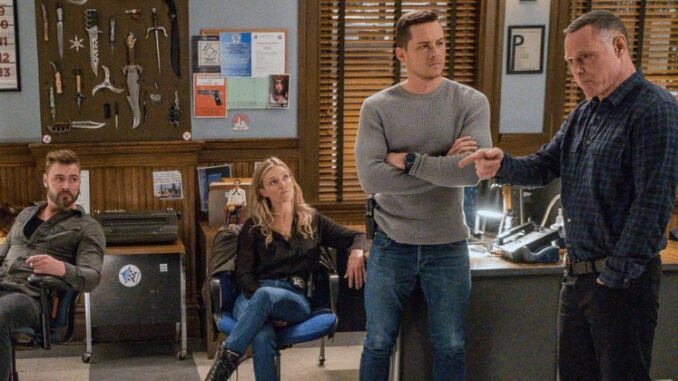
There has been great debate over which villain on Chicago P.D. has been the most notorious, especially after 12 seasons. Some have had complete arcs lasting several episodes, while others have been a one-and-done with only one episode featuring their crimes. From high-profile killers to corrupt cops, the series has had no shortage of storylines over the years. However, it seems that the biggest “villain” may be the part of the NBC series itself and the storylines that come from it. Chicago P.D. has no shortage of men in Intelligence. The same can’t be said for the women who work for Hank Voight (Jason Beghe). Throughout the series, Kim Burgess (Marina Squerciati) took a backseat to Erin Lindsay (Sophia Bush) and Hailey Upton (Tracy Spiridakos). When Upton resigned at the end of Season 11, Kiana Cook (Toya Turner) stepped into Intelligence to help the team. Despite fitting in beautifully, she won’t be returning for Season 13, and it’s a red flag for the series’ most significant problem.
‘Chicago P.D.’ Lost Sophia Bush After Four Seasons
When Chicago P.D. debuted on NBC, the Intelligence Unit consisted of Voight, Burgess, Kevin Atwater (LaRoyce Hawkins), Adam Ruzek (Patrick John Flueger), Antonio Dawson (Jon Seda), Alvin Olinsky (Elias Koteas), Jay Halstead (Jesse Lee Soffer), and Erin Lindsay. The cast was imbalanced from the get-go, with two women among six men. However, the flow appeared good, and the series became a hit behind the flagship series Chicago Fire.
Lindsay became important among the Intelligence officers as Chicago P.D. continued to film. She was a kid who Voight stepped up to help while her mom struggled to be sober and present, and she wanted to become part of Intelligence. After rumblings of some behind-the-scenes issues, Sophia Bush decided to exit the series at the end of Season 4. Bush’s exit began the revolving door that has become a continuously rotating role. As she stepped away, Tracy Spiridakos moved in and into the role.
Hailey Upton Joined Intelligence in Season 5, but Left Six Seasons Later
After Lindsay left, Hailey Upton stepped up to the plate to fill the void left in her wake. She fit in well with the group, and things appeared to go smoothly while filming. The on-screen dynamic didn’t change much, and Upton just went with the swing of things. During the show, Upton had relationships with both Ruzek and Halstead. However, she married the latter before Soffer decided to leave the NBC series. Halstead’s departure changed her, and it was a heavy influence on her storyline.
After seven seasons on Chicago P.D., Upton left to begin a new life, as Spiridakos wanted to leave. Her exit left Intelligence with far more men than women – again. With some original actors gone, the remaining members were Voight, Burgess, Ruzek, Atwater, and Dante Torres (Benjamin Levy Aguilar), who joined Intelligence when Halstead walked away.

Toya Turner Left After Just One Season of ‘Chicago P.D.’ as Kiana Cook
Following Upton’s departure, Kiana Cook joined Intelligence. She got along well with the other team members but side-eyed some of their actions, which made her stand out. Chicago P.D. delved into her history a bit, giving some insight into her relationship with her mother and father, but other aspects of her life remained surface-level at best. Just as she was getting into the groove of being a part of Intelligence, Cook’s time with Intelligence was cut short. She won’t return for Season 13, despite being a crucial part of several cases in Season 12. Turner’s departure is the most problematic of the bunch because she was shown the door despite fitting in well. Cook barely got her feet wet, and her desk set up before being shown the door and replaced with someone new ahead of Season 13’s debut this fall.
Kim Burgess Is the Longest-Standing Female Member, but She Shouldn’t Be Alone
From the beginning, Burgess has played second fiddle to the other women of Intelligence, who have been front and center. Although she was romantically paired with Ruzek off and on until the two married at the end of Season 12, she still hasn’t had a chance to shine. Much of the on-screen focus has been used to prop up their romantic storyline instead of focusing on Burgess as a good cop.
Burgess has done her time and deserves to be up there working with Voight more closely, though it may cause a conflict because the way he handles things doesn’t always sit well with her. She has put in the time and the work, but someone always seems to trump her in casting. Lindsay was the first female lead, followed by Upton, but Cook seemed to be on a level playing field with her.
The changes in female cast members speak volumes about the writers’ inability to commit to storylines and build women into the greater storylines. Surface-level storytelling and one-season offers aren’t just what happens; they are a choice in the writers’ room. While the number imbalance is glaring, the uneven unit limits on which stories can be front and center. With more than double the number of male Intelligence unit members, it’s clear that changing the format isn’t on the writers’ radar.
After 12 seasons and several cycles of the same role being cast and recast, it’s clear that this will continue to be a flaw in the series and it isn’t a priority. The biggest threat isn’t lurking on the streets of Chicago; it is in the scripts. Until the writers choose to break the pattern and acknowledge the disservice they have done to female casting, Intelligence will continue to fight fictional crime in Chicago while also battling a very real and visible gender imbalance.
